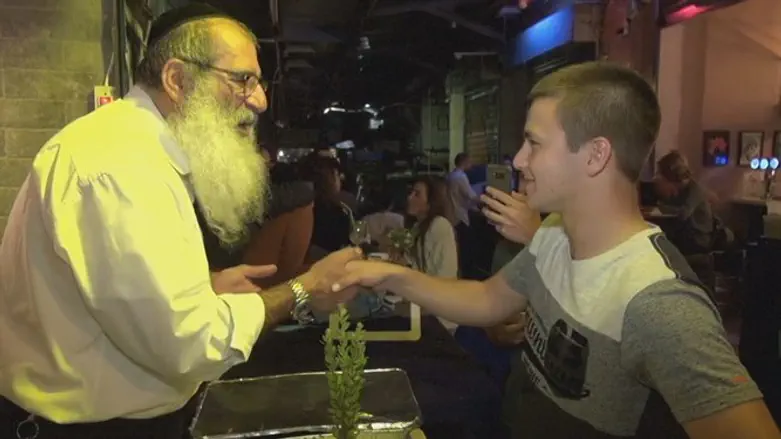
By day the alleys of the Machane Yehuda Market swarm with shoppers seeking bargains on quality produce. After hours, the market’s fruit stalls were once dark and shuttered, but in recent years have been converted to trendy bars, pubs, and restaurants. Throngs of twenty-something Jerusalemites pack the market’s alleyways until near sunrise, drinking, dancing, and relaxing.
In the midst of it all, behind a table in a former food stall between two bars under a sign proclaiming “Hamakom” (“The Place”), stands Rabbi Yechezkel Shalom smiling jovially through a thick white beard and greeting people with love and respect. Of course the table is set with food. People sit and talk with the Rabbi, sometimes until 3:00 a.m. sharing their feelings about being Jewish, and many return every time they come to the market. Hundreds of people each week go out for drinks and return home with inspiration.
An Israeli of Iraqi heritage from Tel Aviv, Rabbi Shalom served in the Yom Kippur War, and later found his way back to traditional Judaism. He has been active in kiruv—reaching out to Jews who never had a proper Jewish education—for 25 years, and devotes himself to giving young Jewish people a positive encounter with their religion.
The idea for Hamakom came to Rabbi Shalom when talking to New York lawyer Robert Tolchin about protests in Jerusalem against businesses being open on Shabbat. “I asked Rabbi Shalom why people don’t understand they will never inspire people to come closer to Judaism by insulting them or throwing garbage at them,” said Tolchin. “Someone should set up a table in front of a bar open on Shabbat and offer people a piece of kugel, a chance to make Kiddush, something positive, with no judgments, just love.” Rabbi Shalom loved the idea of bringing a taste of Judaism to a secular environment. When an opportunity to lease a stall in the market came along, Hamakom was born.
Rabbi Shalom believes “each person is a world, just as important to the Jewish People as anyone else. Nobody can be left behind. Each person deserves to be welcomed with dignity.” He describes Hamakom as “an outpost of love and kindness.” Sitting nightly at Hamakom he describes himself as “trying to show people the beauty of our religion, our nation, and the Jewish people.”
The approach seems to work. Visitors, attracted perhaps by crackers and cheese or watermelon, develop a rapport with Rabbi Shalom and return each time they come to the market to talk some more. “People are starting to see a new side to religious Jews,” said Rabbi Shalom. “Just as we try to bring Heavenly Jerusalem down to Earth, we try to raise our Jerusalem upwards as well, one person at a time.”
Hamakom receives no funding from any organization. Its costs are covered entirely from individual contributions. In the works are plans to raise money to create a program for some of the people who meet Rabbi Shalom at night to learn during the day, and to expand to other locations such as the old Central Bus Station in Tel Aviv where a similar after-market nightlife scene has emerged.
Click Here to Donate and Make A Difference